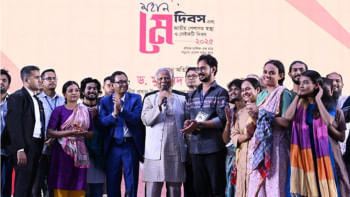Money launderers invent new ways
Money launderers are coming up with new and inventive ways to go about their financial crimes, the Bangladesh Bank Financial Intelligence Unit (BFIU) found.
The central bank's anti-money laundering arm depicted a total of ten such cases that took place last fiscal year in its latest annual report, which was unveiled yesterday by Bangladesh Bank Governor Atiur Rahman.
The case studies and typologies presented in the report would work as high-quality training materials for bankers, he said. “If we can perform the responsibilities given to the BFIU properly, the siphoning-off of money will come down.”
In one of the case studies, a gang of Bangladeshi human traffickers used the mobile banking platform to collect ransom.
The gang lured some young men, mostly from Dubai and Sharjah, and flew them in to Iran upon promise of lucrative jobs in Saudi Arabia, Iraq and Greece. They confined the men in a house and took away their passports and other belongings.
The traffickers then forced the hostages to contact with their families in Bangladesh and instruct them to pay ransom, which ranged from Tk 1.5 lakh to Tk 3 lakh, through a popular mobile financial service provider in Bangladesh for their release.
The BFIU investigation found that a total of 23 mobile banking accounts were used to collect ransom amounting to Tk 21.52 lakh.
Some of the accounts were opened using fake IDs, while some of the transactions were done using 20 unique mobile banking customer accounts under the agent's name within a short period of time.
As per rules, an agent is not permitted to open mobile banking customer accounts on behalf of others under his/her name and is not allowed to transact to others through either his/her mobile banking agent account or personal mobile banking account.
The case was forwarded to the Criminal Investigation Department of Bangladesh Police, who filed a case in this regard. And with the help of the Iranian authority, 13 of the kidnapped persons were rescued.
In another case study, one official of a government project and a businessman, both relatives, opened six accounts in two branches of a commercial bank in seven months.
The accounts were opened in different names and they were shown to be students or housewives.
The accounts did not have any significant transactions save for some IPO (initial public offering) investments. But suddenly over a three-month period, large amounts were deposited in the six accounts through electronic fund transfer.
This alerted the bank and they started to keep an eye on the accounts. In the meantime, the government agency came to know that one of their officials illegally transferred the entire project fund of Tk 1.27 crore through electronic fund transfer by using various codes and the whole amount was deposited to the six accounts.
The concerned bank reported those as "suspected transaction report" to the BFIU, who then froze the accounts and referred them to the Anti-Corruption Commission for legal action.
Another case study involved a senior banker of a commercial bank and an industrialist.
The banker was posted to the financial institution's overseas outpost, when the industrialist appointed him as the chief executive officer of the company he was about to set up there.
To set up the foreign company, money was sent from exchange houses in Dubai and Singapore. The banker did not resign from his post at the bank, rather worked at the industrialist's foreign company in secret.
Meanwhile, an import-related complaint about the industrialist, who owns two steel mills, cropped up. Relevant information was collected from banks and customs houses and it was found that the steel companies opened seven letters of credit, amounting around $67 million, to import raw materials and the exporter was that foreign company helmed by the banker.
The banker then opened a foreign currency account in Bangladesh, whose introducer was the industrialist. The account was used to send back the amount transmitted by the steel companies in the first place, with their sender being the banker and the industrialist.
Later on, the banker went on to become a director of a newly opened non-resident Bangladeshi bank in the country. To be a director of an NRB bank, the NRB must send remittance through formal banking channel.
Investigations deduced that the banker was the dummy director for the industrialist, who was not an NRB. The industrialist over-invoiced the amount and had it sent back to Bangladesh, to qualify for directorship at the NRB bank.
All the relevant papers were sent to the finance ministry as per their request and the case was sent to the ACC for further investigation and necessary legal actions as per anti-money laundering act.
Meanwhile, a total of 619 suspected transaction reports were sent to the BFIU last fiscal year, up from 420 sent in fiscal 2012-13 and 175 in fiscal 2011-12.
After analysing the reports, the BFIU identifies predicate offences related to money laundering.
In fiscal 2013-14, it identified 71 such predicate offences, among which the top 15 were corruption-related and 11 fraud-related.
The remaining offences were related to currency smuggling, bribery, financing in terrorism, murder, over invoicing, kidnapping and others.

 For all latest news, follow The Daily Star's Google News channel.
For all latest news, follow The Daily Star's Google News channel. 



Comments